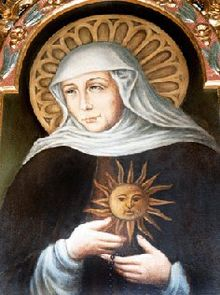St Jutta

Married woman. Jutta lived in 13th century Thuringia, now Eastern Germany. She was married at the age of 15 to a nobleman and bore children by him. During their marriage Jutta, her husband and children led very prayerful lives. He died while they were on a pilgrimage to Jerusalem. Each of her children eventually entered a monastery upon reaching a suitable age, and this left Jutta able to pursue a more austere religious way of life.
Jutta became a member of the Third Order of St Francis. She gave away or sold her property and lived the rest of her life in contemplation and in caring for the poor and the sick. She became a figure of ridicule among her neighbours as she carried out her service to the poor of the region.
In her last years, Jutta moved to the frontier of Christian Europe. She chose as her base a derelict building in Bildschön (now Bielczyny), near Kulmsee in Prussia, part of the Monastic State of the Teutonic Order, the area governed by the Teutonic Knights, whose Grand Master, Anno von Sangershausen, was a relative of hers. There the knights sheltered her. Visitors came to her to receive counsel and prayers, and she quickly established a reputation as a saint.
Jutta dedicated her final days to praying for the non-Christian population of the region. She died around 1260. In keeping with her wishes, Archbishop Friar Heidenreich of Kulm, OP, earlier Archbishop of Armagh, Ireland, and now first Bishop of Kulm, had her buried at the cathedral. A cult developed around her immediately and the Kulmsee cathedral and Jutta's hermitage near Kulmsee in Prussia, (now Chelmza in Poland) became a popular place of pilgrimage.












